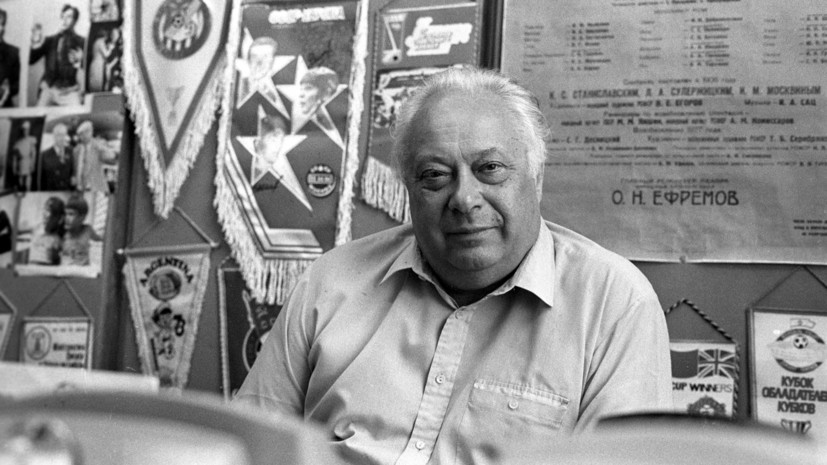The last memory of Nikolai Nikolaevich is a cruise ship from Odessa, on which in the fall of 1994 a free trip to the Black and Mediterranean Seas was organized for Olympic veterans.
An amazing, albeit rather motley, football company gathered on board: Igor Netto, Valentin Bubukin, Boris Radzinsky, Igor Belanov, and some other ex-players.
Of course, they all clustered around Ozerov in one way or another.
The master could no longer move independently (in the early 1990s, his foot was amputated), he sat in a wheelchair at all evening events and somehow already on the way back he asked the players: “Guys, lift me up to the upper deck - I want the sunset look".
Outside that evening, a brutal storm raged with a squally icy wind, and, wrapping the commentator's legs in a warm woolen blanket, I quietly asked him: “Nikolai Nikolayevich, maybe you don’t need to go on deck today?
Maybe next time?"
He looked up at me, covered my hand with his palm, as he did many times in Ostankino, when during my work on television I brought him certain texts for news releases, and very gently said: “Next time, Lenochka, I most likely won't.
That's why I want ... to be in time.
He died a little over two years later - at 74, and only now I understand how little it is.
The life of prominent people is usually divided into professional, which is in plain sight, and personal, which does not interest anyone if problems appear in it.
Such a problem for Ozerov was a serious illness.
Because of her, already in the 1980s, it became increasingly difficult for him to comment.
Gradually, he disappeared from the air, which in the television format is itself perceived as the end of life, but he continued to occupy a small office in Ostankino, where we, cadets, periodically brought texts written for the master.
When such a duty first fell to me, I, unwittingly, greatly framed Nikolai Nikolaevich by writing three short notes for the news release.
The first featured a new skateboard for those times.
The second was dedicated to the victory of Russian water polo players in the Hungarian Tungsram Cup.
The hero of the third was a Soviet wrestler with a completely unpronounceable last name.
As a result, Ozerov stumbled three times, for which a monstrous flurry of criticism fell upon the entire sports department at the morning planning meeting.
Then it was also not clear to me how, having existed for decades in a very difficult, intriguing television world, Ozerov managed to retain so much inner wisdom and kindness.
He was absolutely organic in the profession, but at the same time he was, as it were, above it.
They teased him, but at the same time no one was up to Uncle Kolya in any way.
And even what he did on the air contrary to some established canons, as well as quite numerous liberties that sometimes turn into blunders, were perceived as a classic of the profession, those very facets of it that turn a diamond into a diamond.
Probably, there is no need to recall the sporting and acting greatness of Ozerov.
Although this layer of his biography is no less surprising than the commentary.
It's just that titles do not reflect the true scale of the personality, but things are much more, at first glance, prosaic.
Attention to people, interest in life, readiness to help, support, teach something, even when you realize that death is not far off.
Involvement.
This is perhaps the main quality that distinguished the work of Ozerov, any of his reports.
I don't know if it was acting.
Given the entire background of the great commentator, more likely than not.
In the performance of the brilliant actor, the sports world received bouquets of exclusive and still memorable pearls: “Dynamo players today perform without the usual blue underpants”, “The Russian team fell into a liquid black streak of bad luck”, “Here he is holding an opponent by his underpants, by a T-shirt, by the sides ... For almost everything that is possible, he holds”, “Instead of playing football, they would go to hand over the bottles”, “Ai-yay-yay-yay-yay!
Do you agree with me?
For any of these phrases in those days, one could be forever excommunicated from the air.
Ozerov, on the other hand, behaved as if he could do anything.
Even years later, almost devoid of work, he remained internally absolutely free, and this showed through in his every gesture.
At the same time, the celestial could be asked any question - and if time allowed, he always explained everything in the most detailed way.
... We were never able to lift it to the upper deck on that cruise, although one of the crew members even managed to bring a hefty piece of tarpaulin, removing it from one of the lifeboats to shelter Ozerov from the water whipping from all sides.
The staircase turned out to be too narrow and slippery - it was simply dangerous to lift a wheelchair up it.
And I am still terribly sorry to remember that Nikolai Nikolayevich never saw that sunset.

